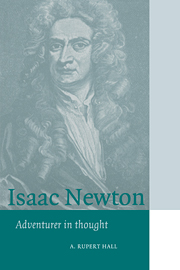Book contents
- Frontmatter
- Contents
- List of Figures
- General Editor's Preface
- Foreword
- Acknowledgement
- 1 The Hopeful Youth, 1642–1664
- 2 “The prime of my age for invention”, 1664–1667
- 3 Widening Horizons, 1667–1669
- 4 The Professor of Mathematics, 1669–1673
- 5 Publication and Polemic, 1672–1678
- 6 Life in Cambridge, 1675–1685
- 7 The Chemical Philosopher, 1669–1695
- 8 The Mathematical Principles of Natural Philosophy, 1679–1687
- 9 Private and Public life, 1685–1696
- 10 Fluxions and Fury, 1677–1712
- 11 Opticks, or a Treatise of Light, 1687–1704
- 12 Life in London, 1696–1718
- 13 A Man of Authority and Learning, 1692–1727
- 14 Later Books, 1706–1726
- 15 Kensington, 1725–1727
- Appendices
- Notes
- Bibliography
- Index
13 - A Man of Authority and Learning, 1692–1727
Published online by Cambridge University Press: 12 January 2010
- Frontmatter
- Contents
- List of Figures
- General Editor's Preface
- Foreword
- Acknowledgement
- 1 The Hopeful Youth, 1642–1664
- 2 “The prime of my age for invention”, 1664–1667
- 3 Widening Horizons, 1667–1669
- 4 The Professor of Mathematics, 1669–1673
- 5 Publication and Polemic, 1672–1678
- 6 Life in Cambridge, 1675–1685
- 7 The Chemical Philosopher, 1669–1695
- 8 The Mathematical Principles of Natural Philosophy, 1679–1687
- 9 Private and Public life, 1685–1696
- 10 Fluxions and Fury, 1677–1712
- 11 Opticks, or a Treatise of Light, 1687–1704
- 12 Life in London, 1696–1718
- 13 A Man of Authority and Learning, 1692–1727
- 14 Later Books, 1706–1726
- 15 Kensington, 1725–1727
- Appendices
- Notes
- Bibliography
- Index
Summary
Newton served the State in a variety of capacities for thirty years; he not only embodied in his own person (as Pepys had formerly done at the Admiralty and his contemporary William Lowndes did at the Treasury) a novel conception of the high-ranking, efficient, professional civil servant, but helped to established the character of the English government official in the parliamentary age: as a man of integrity, unremitting in his attention to business, thoroughly competent in matters of detail yet no mere clerk – a head of department able to realize ministerial policy in concrete terms.
As we have seen, Newton's association with government began with his election as a university Member of Parliament for Cambridge in January 1689. After the thirteen months – including a long summer recess – of the Convention Parliament no one at Cambridge seems to have wished to propose Newton for a second term. Two years after his translation to the mastership of the Mint (25 December 1699) he was again nominated and elected Member of Parliament for the university. He is known to have supported Halifax and the Whig Junto on a vote of confidence but was in general no more obvious in the House of Commons than before. When the Parliament was dissolved after a few months (2 July 1702) Newton refused to stand again unless unopposed: ‘To solicit and miss for want of doing it sufficiently, would be a reflection upon me, and it's better to sit still.”
- Type
- Chapter
- Information
- Isaac NewtonAdventurer in Thought, pp. 322 - 348Publisher: Cambridge University PressPrint publication year: 1996

